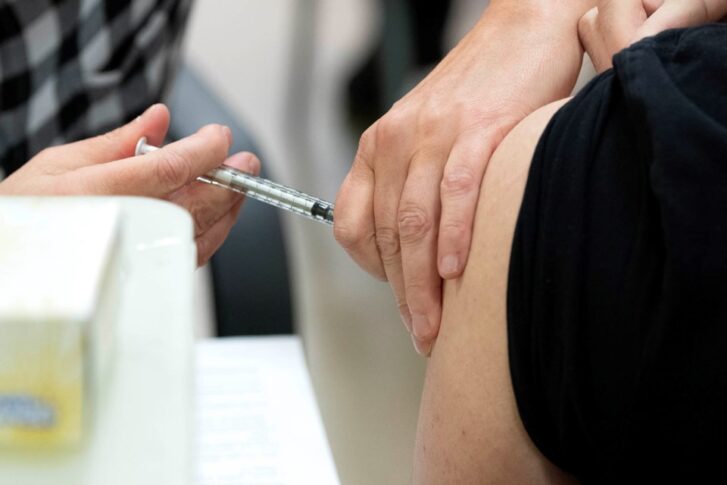This post is also available in: 简体中文 繁體中文
While COVID-19 vaccination was relatively high in Canada for the first two doses, the same can’t be said for the booster shot. Numbers are similar across Canada, with a large drop-off in uptake between the second and third vaccine dose.

Listen to this article
While COVID-19 vaccination was relatively high in Canada for the first two doses, the same can’t be said for the booster shot.
Numbers are similar across Canada, with a large drop-off in uptake between the second and third vaccine dose.
Overall, 81 per cent of the eligible Canadian population has two doses of the COVID-19 vaccine. Forty-seven per cent have all three.
While 82 per cent of Ontarians are double vaccinated, only 49 per cent have three doses. In B.C., 85 per cent have two doses, but only 53 per cent have received their third dose.
It’s the same in Manitoba, where 78.2 per cent of eligible Manitobans are double-dosed. That drops to 41 per cent for the booster shot.
Virologist Alyson Kelvin believes many people are not aware of how crucial the third dose is because of how politicians and health officials have decided to name the doses.
“It’s important that we are flexible in our understanding of what fully vaccinated means in this dynamic time in the change of your immune memory, and the changing of this virus,” said Kelvin of the University of Saskatchewan.
“Having that third dose is so protective against severe disease, and hospitalizations, and deaths associated with SARS-CoV-2.”
Kelvin says before third doses even became available, it was thought that two doses was the path to full immunity, which is why the term fully vaccinated became associated with two shots.
She says that’s no longer the case, and public-health officials need to stop calling the third dose a “booster” and inform the public that it’s a crucial shot for immunization.
Dr. Andrew Boozary, a primary care physician in Ontario, says hospitalizations are rising along with case counts and levels of COVID in wastewater data.
He says the lifting of restrictions in provinces across Canada has given Canadians a false sense of security.
“What we’re seeing on the ground is real confusion,” said Boozary, the executive director at the Gattuso Centre for Social Medicine (University Health Network). “It sounds like from policy makers that this is over, when the risks continue to be very real.
“People see their loved ones get infected, people at higher risk and without third doses have a much larger risk of ending up in a hospital or an ICU bed.”
Boozary believes Canadians need to be more capable of adapting to a changing situation.
“Of course we wanted it to be a two-dose vaccine, but the reality is, this is requiring three doses to get that full protection and keep people out of hospital,” he said.
In addition to some misinformation stifling the third dose uptake in Canada, Boozary says there are still real roadblocks from those experiencing homelessness, or hesitation from racialized communities.
He says the pandemic has unearthed barriers that have always been in place, and the time is now to recognize them, eliminate them, and work to getting more Canadians and the rest of the world fully vaccinated.
Article From: CityNews

